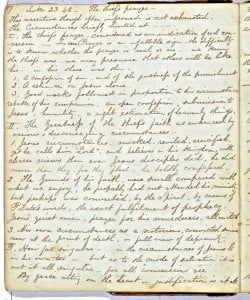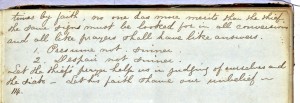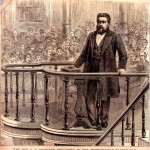
Yesterday, I interviewed Dr. Christian George, Assistant Professor of Historical Theology and Curator of the C. H. Spurgeon Center for Biblical Preaching at Midwestern Baptist Theological Seminary, about his forthcoming (2017) publication from B&H Academic, The Lost Sermons of C. H. Spurgeon. This book will include previously unpublished sermons that Christian found during Ph.D. research at the University of St. Andrew’s in Scotland, along with critical commentary notes from Christian himself.
One such sermon is “The Thief’s Prayer,” a sermon Spurgeon preached at 18-years old during the earliest years of his ministry. Here’s more information on the sermon from Christian George:
“Spurgeon delivered this sermon, “The Thief’s Prayer” (Notebook 2, Sermon No. 87) in 1852, about one year after Herman Melville published Moby Dick. This sermon marked the 114th time that Spurgeon had preached since his call to ministry. He was eighteen years old and had served Waterbeach Chapel as their pastor for less than a year. Under his pastorate, his congregation would expand from 30 to approximately 400 members. During this year, Spurgeon experienced a major turning point in his life in deciding to remain as pastor of his congregation instead of attending Stepney College.
This sermon is based on Luke 23:42, “And he said unto Jesus, ‘Lord, remember me when thou comest into thy kingdom.’” Like other sermons in this notebook, Spurgeon exposes the surrounding context of the passage before moving from observation to application. His opening sentence, “This narrative [,] though often improved [,] is not exhausted,” will be echoed throughout his later ministry in London in statements like, “… [N]o Scripture is exhausted by a single explanation. The flowers of God’s garden bloom, not only double, but sevenfold; they are continually pouring forth fresh fragrance.”

Given the overlapping content, it is likely that Spurgeon used this outline as the base of his later sermon “The Dying Thief in a New Light,” preached on January 31, 1886. In typical fashion, Spurgeon concludes this sermon with a challenge: “Let the thief’s prayer help us in [the] judging of ourselves and the sick. Let his faith shame our unbelief.”
Christian was kind enough to provide the full transcription of Spurgeon’s notes below.* Enjoy!
The Thief’s Prayer — Luke 23:42
“And he said unto Jesus, ‘Lord, remember me when thou comest into thy kingdom.’”
This narrative, though often improved, is not exhausted. The Circumstances briefly hinted at:
I. The thief’s prayer, considered as an indication of real conversion. Sincere Prayer is an
infallible sign. The difficulty is to know whether the prayer is real or no. We know the
thief’s was. We may presume that others will be like his. In his, there was this:
1. A confession of sin and of the justness of the punishment.
2. A reliance on Jesus alone.
3. Good works followed in proportion to his circumstances. Rebuke of his
companion, an open confession, submission to Jesus, humility, a right
estimation of heavenly things.
II. The Greatness of the thief’s faith as enhanced by various discouraging circumstances.
1. Jesus[’s] circumstances. Mocked, reviled, crucified. Yet, he calls him “Lord,”
and believes in his kingdom with clearer views than even Jesus’ disciples
did. He did more than they, for they fled. He boldly confessed.
2. The Grounds of his faith were small compared with what we enjoy. He
probably had not attended his ministry, but perhaps was converted by the Spirit
by means of Pilate’s words, the exact fulfilment of prophecy. Jesus’ quiet
mien, prayer for his murderers, all united.
3. His own circumstances as a notorious, convicted sinner now at the point of
death. In full view of depravity.
III. How far singular, in the circumstances of Jesus, & in his own, too. But as to the mode
of salvation, it is not at all singular, for all conversions are by grace acting on the
heart. Justification is at all times by faith. No one has more merits than the thief. The
same signs must be looked for in all conversions. And all like prayers shall have like
1. Presume not, sinner.
2. Despair not, sinner.
Let the thief’s prayer help us in [the] judging of ourselves and the sick. Let his faith shame our unbelief.
*Reproduction or publication of this text is strictly prohibited without expressed written consent of Dr. Christian George and B&H Academic.












